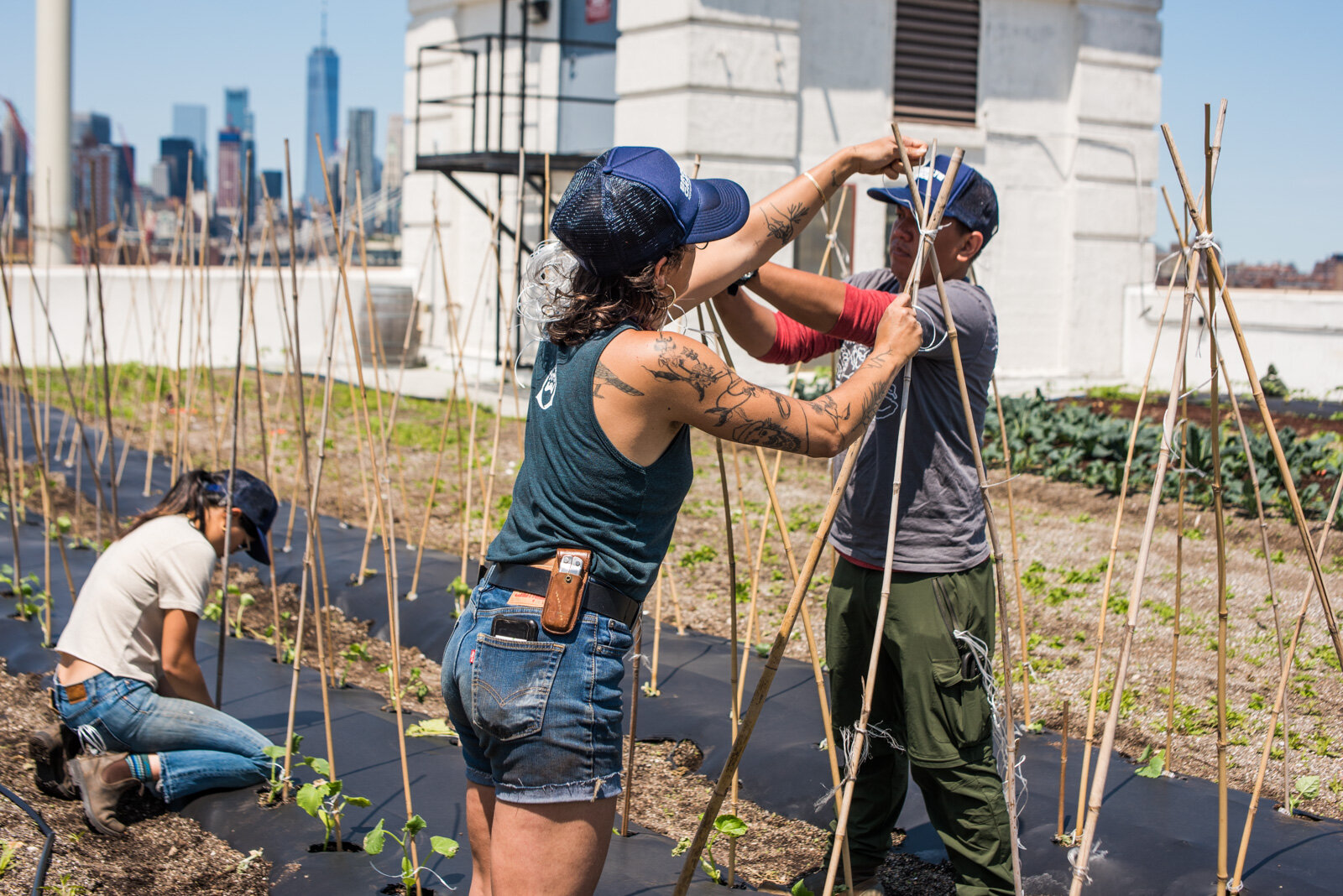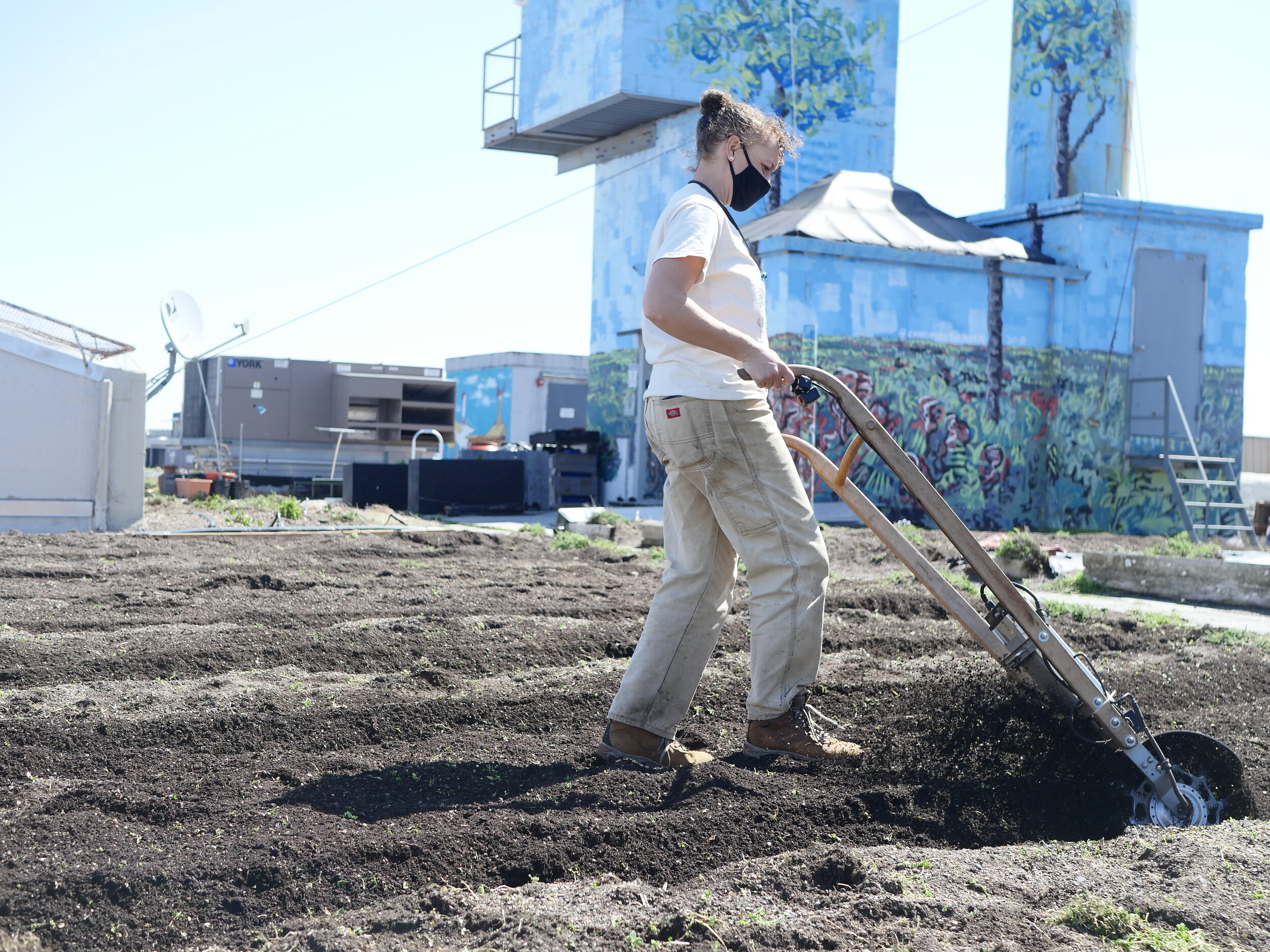
OUR FARMING PRACTICES
At Brooklyn Grange, we transform bare roofs into ecosystems, and we employ natural farming practices which help those ecosystems thrive with as little human intervention as possible. Farming this way yields harvests packed with nutrients and devoid of chemicals, providing maximal health benefits to every participant in our ecosystem–from the smallest insects to the families who purchase our vegetables.
SOIL
Healthy ecosystems start with healthy soil. Ours was created by a cooperative of mushroom growers in Chester County, PA who blend their spent compost with local inputs like horse manure and balance it with aggregate for drainage and weight (read more about it here). Our soil is a constantly-evolving and living organism, and regular applications of compost, which we make from our own plant waste, food scraps from our events program and several neighboring businesses, are critical to maintaining and building soil health. We use organic-approved amendments including fish emulsion, dry NPK blends, potassium nitrate, and Biochar, and we mulch with cocoa husks and wood shavings from neighboring businesses in the Navy Yard. In the winter, we cover crop using oats, clover, peas and vetch to fix nitrogen, prevent erosion and increase organics in the soil. We have also partnered with Cornell University and Skyland USA to test and improve over the years, focusing on water retention, organics retention, and also monitoring buildup of air pollutants over time (we are happy to report that the effects of air pollution on our soil and crops does not impact plant or human health).
SEED AND CROP SELECTION
Every winter, when our farmers kick the dirt off their boots for good and settle down into the office for crop planning, they look back at last year’s crop plan and make tweaks to the plan for the coming spring. When taking on this review they ask questions like “what sold well last year?” “what didn’t do well in the field?” and “should we try a new variety of something?” As a result, our crop plans have varied year after year, impacted by market forces, restaurant closures, new accounts like Fresh Direct and our Equitable Food Distribution program, and the desires and interest of our customers, farmers, and community. We rotate crops as often as possible, especially our fruiting crops, like tomatoes, that are more prone to disease, thus reducing the transmission from season to season.
PEST AND WEED MANAGEMENT
When pests make their way to our roofs in large enough numbers to stress our crops, we introduce beneficial insects, such as ladybugs, lacewings, preying mantises, and the mite predator Phytoseiulus persimilis. Occasionally, we'll use a "good bug"-friendly spray, like organic insecticidal soap diluted in water, or Pyganic, both of which are quite effective at defeating our insect nemesis, aphids. In spite of farming several stories up, we are unfortunately not immune to weeds. We do our best to reduce their numbers by employing the stale seed bed technique, and mulching intensively with upcycled materials like silage tarps, burlap bags, saw dust from untreated wood and even cocoa husk from local whole-bean confectioners, Raaka Chocolate and Mast Brothers.
TOOLS
Because we're on a roof, we don't have access to large, motorized farm tools like tractors and harvesters. Our location and our relatively small scale means that we have to rely on small tools, creativity, and human hands to cultivate our fields. Some of our favorite small tools are the Tillie - a rechargeable battery-powered cultivator that we use for shaping and turning over our harvested beds. Our greens harvester, which operates by engaging a battery-powered drill, is also a popular tool among our farm team, and an upcycled spin washing machine converted into a giant salad spinner has significantly decreased our wash-and-pack time. We also couldn’t run our farms without our CoolBots, which allow us to transform a window AC unit into a walk-in cooler on each of our farms!
WATER AND IRRIGATION
Intensive mulching also helps keep moisture from evaporating, which is crucial on our breezy, well-drained farm. We irrigate with NYC water using a combination of low aerial sprinklers on direct-sown crops, as well as highly efficient drip irrigation, combined with rain sensors to prevent unnecessary use. We are currently researching moisture sensors to further increase efficiencies.
FOOD HANDLING & PACKING
We harvest and distribute our produce in reusable plastic bins upcycled from vineyard shipments. Salad greens and other looseleaf items that require bagging at farmer's markets and CSA distributions are packed in biodegradable plastic. And while our wholesale harvests are delivered to local chefs and grocers, none are more than a few miles from our farms. Moreover, CSA members and market shoppers who visit our on-site farmstand often walk to pick up their produce, then walk it home–resulting in meals that made the journey from seed to plate without ever using an ounce of fossil fuels! Sure, it's a tiny drop in the bucket, but with the average distance traveled by supermarket-bought food hovering at a whopping 1,500 miles, every drop counts.





